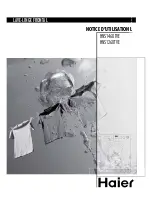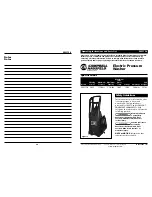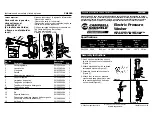
SYMPTOMS OF CARBON MONOXIDE POISONING
Carbon monoxide (CO) is a colorless, odorless, tasteless, extremely toxic gas that
can
KILL
in a matter of minutes. Breathing air containing carbon monoxide
produces symptoms of headache, dizziness, loss of muscular control, a sleepy
feeling and finally coma. Moderate or severe brain damage can result from inhaling
air containing carbon monoxide. Carbon monoxide is a product of incomplete
combustion of fuels and occurs in exhaust fumes of fuel-burning heaters and all
internal combustion engines. Carbon Monoxide collects in spaces where there is no
constant air flow or ventilation.
If you start to feel sick, dizzy or weak due to
exposure to CO while using gasoline engine, GET TO FRESH AIR IMMEDIATELY
.
ADDING OR DRAINING FUEL TO OR FROM THE ENGINE
Fuel and fuel vapors are extremely flammable and
explosive. Fire and explosion can result in severe burns
and even death.
• Turn engine to the
OFF
position and let cool at least two minutes before
removing fuel cap. Loosen cap slowly to relieve pressure in fuel tank.
•
DO NOT
fill or drain fuel tank inside enclosed structures. Accidental sparks
can result in fires or explosions leading to severe burns and even death.
•
DO NOT
overfill fuel tank. Leave ample space for expansion of fuel.
•
DO NOT
start engine in area of fuel spillage. Fire and explosion can occur.
• Keep fuel away from sparks, open flames, pilot lights, heat and other ignition
sources.
DO NOT
smoke while operating the engine.
•
DO NOT
tip engine or equipment at angle that could result in fuel spilling
from fuel tank.
STARTING THE ENGINE
Starter cord kickback (rapid retraction) can
pull your hand and arm toward the engine faster than it can be let
go of. Failure to be aware of this function can result in broken
bones, fractures, bruises and sprains can result.
• When starting the engine, pull cord slowly until resistance is felt, then pull
rapidly to avoid kickback.
8
Summary of Contents for 870599
Page 44: ...42 ...











































